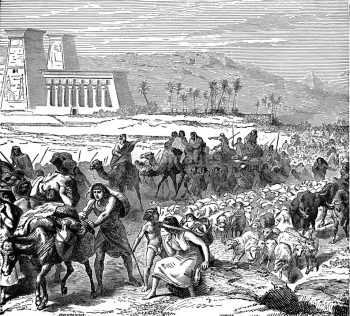Passover is NOT the time of our FREEDOM – it’s the time of our CHERUT. What’s the difference?
 In almost all English translations of the Passover Hagaddah we call Pesach, the “Season of our Freedom” (Zman Cherutaynu).
In almost all English translations of the Passover Hagaddah we call Pesach, the “Season of our Freedom” (Zman Cherutaynu).
And we declare “… it is our duty to thank and praise … [God, who] took us from slavery to freedom (meAvdut l’cherut)”.
In English, Freedom means “the power or right to act, speak, or think as one wants without hindrance or restraint.” In other words, the independence to do what you feel like doing. You are no longer a “slave or servant” to anyone.The Hebrew word for this kind of “Freedom” is CHOFESH. not CHERUT
In the Exodus story, we all remember that Moses demands that Pharaoh release the Hebrew slaves by saying, “Let my People go!”
But in our lust for independence and freedom to do as we want, we forget that it is not Moses demanding that Pharaoh release the Hebrew slaves. It is Moses and Aaron speaking on behalf of God who is doing the demanding!

Read this verse very carefully (Exodus 10:3) … “And Moses and Aaron came to Pharaoh, and said to him, Thus said the Lord God of the Hebrews, How long will you refuse to humble yourself before me? Let MY people go, that they may SERVE ME.”
“Shlach ami veya’avduni” means that God is telling Pharaoh that the Hebrews will no longer be slaves to Pharaoh and serve him, but they will become slaves to God and serve HIM!
The Torah teaches us that we human beings are finite and therefore dependent on something other than ourselves for our existence. We are in a subservient relationship with a higher power that created us, sustains us with every breath and watches over us.
Sometimes we delude ourselves and think human beings like Pharaoh, or Golden Calves have power over us and we turn them into gods and serve them. In Hebrew we call that Avodah Zara (Idol worship… or literally “strange worship”). The purpose of the Exodus was to release us from being servants to Pharaoh and to become servants of God.
We can only become truly liberated from slavery to Pharaoh when we learn how to be meaningful servants of God. That can only be done when God reveals to us how to serve Him. That is what happened seven weeks after the original Passover when the Jews received Torah at Sinai on Shavuot.
The original Tablets brought down by Moshe from Mount Sinai had the commandments “etched” (Charut) into the stone. The Sages of the Talmud said don’t read it as “charut – “etched,” but rather “Cherut – “free”. Serving God means fulfilling His Will. Therefore, explain the Sages, “The only truly free person, free to serve God, is the one immersed in Torah,” with God’s Will etched into his or her heart.
Wishing you all a truly meaningful Passover
Shalom and Happy Passover!
I heard about four covenantal relationship. Servitude, friendship, sonship and marriage each one is based on agreement and its domain. Service is purely material- you serve cause getting paid or left alive in case of a slave. Friends share willingly and with joy to even serve each other. Family has even stronger bounds cause children inherit blessing and curse from the parents. Marriage is highest stage of relationship couple shares all including their own lives and bodies becoming one flesh. Each next relationship includes previous but elevate it to a new level.
God called Israel from Egypt to become His servants to keep the promise to Abraham but God called Abraham a Friend. Israel was freed from Pharaoh with promise to become His Bride not just to stay servant. In the World to come there won’t be servitude, all relationships would be elevated to at least friendship. That’s why islam has no future but also any other submission has to go, from any religion. If you serve God serve as friends do, as Abraham – with trust.